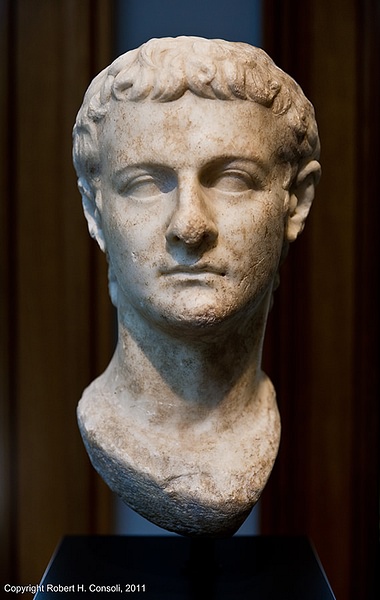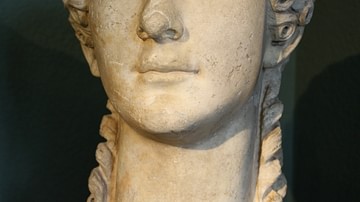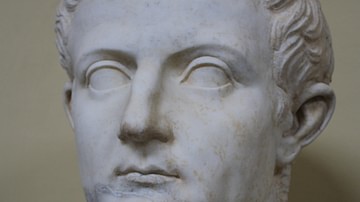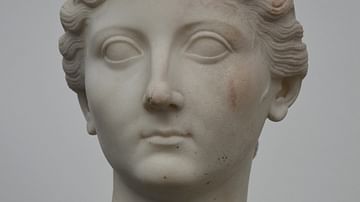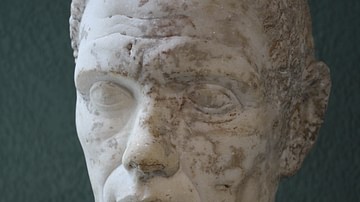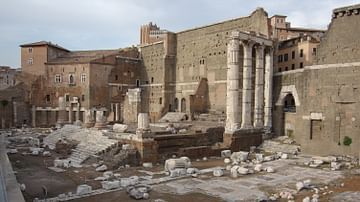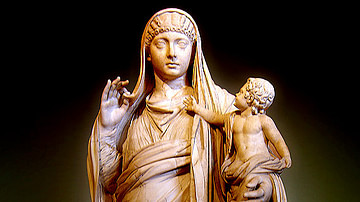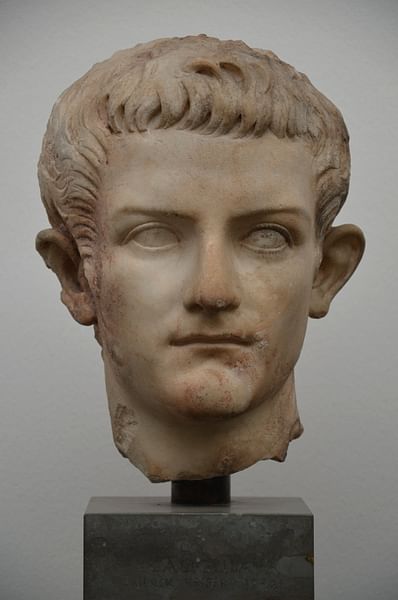
Caligula (Gaius Julius Caesar Augustus Germanicus) was Roman emperor from 37 to 41 CE. Among the great emperors of the Roman Empire stand Augustus and Marcus Aurelius. At the other end of the spectrum is Emperor Caligula who the historian Suetonius (c. 69 – c. 130/140 CE) simply calls a monster. In his The Twelve Caesars he further added:
It is difficult to say whether weakness of understanding or corruption of morals were more conspicuous in the character of Caligula. He seems to have discovered from his earliest years an innate depravity of mind, which was undoubtedly much increased by defect of education.
After a short but troubled reign which saw him alienate both the Roman army and the Roman Senate, ruthlessly dispatch rivals and critics, and infamously propose he make his own horse a consul, the emperor was butchered in January 41 CE by his own bodyguard, the Praetorian Guard.
Early Life
Born Gaius Julius Caesar in 12 CE, Caligula was the son of Germanicus (hero of the German campaign) and Agrippina, granddaughter of Emperor Augustus (her mother was his daughter Julia). The name "Caligula" is actually a nickname meaning "little boots," derived from the miniature uniform he wore as a child while on campaign with his father. The precocious youth served as the company's mascot. Shortly after the death of his family, Caligula moved to the Isle of Capri where he was raised by the Roman Emperor Tiberius (r. 14-37 CE) as what some historians consider a prisoner. Although Germanicus' death is suspicious, Tiberius is thought to have been instrumental in the death of Caligula's mother and brothers.
Since Caligula and his sisters were considered to be of no immediate threat, they were allowed to live. While on the island, Caligula witnessed the brutality and savage behaviour that was Tiberius. On Capri, he was surrounded by corruption and excess. Suetonius said:
… even in those days Caligula could not control his natural brutality. He loved watching tortures and executions; and, disguised in wig and robe, abandoned himself nightly to the pleasures of feasting and scandalous living.
Caligula Becomes Emperor
Upon the death of Tiberius on 17 March 37 CE, Caligula became the co-emperor of the Roman Empire with Tiberius' son Gemellus. Caligula, however, soon came to be the lone ruler with the death of Gemellus. (Caligula is suspected of having a hand in the death of his co-emperor.) Since Tiberius had never been a popular emperor, the citizens of Rome welcomed the young emperor, and Caligula soon earned this admiration. He ended the treason trials instituted by Tiberius, recalled exiles, and gave long overdue bonuses to the Praetorian Guard. He completed a number of building projects started by the former emperor, rebuilt decaying temples, built a lighthouse at Boulogne, began work on new aqueducts and even built a new amphitheatre in Pompeii. There were numerous gladiatorial games and chariot races to entertain the people.
Within six months after assuming power, however, everything changed: After coming close to death (historians are divided on the cause - a possible breakdown or epilepsy), Caligula became a different person. He was more paranoid, and the Caligula some had seen on Capri re-emerged. After having reduced taxes earlier in his reign, he raised them in order to pay for his excesses. He instituted a series of purges against suspected enemies, including even his first wife. He brought back the treason trials of Tiberius. He condemned others in order to confiscate their property. Suetonius adds that he became more sadistic and "showed the keenest interest in witnessing the suffering and torment of those condemned being tortured." In reference to a series of gladiatorial games attended by Caligula, the historian Cassius Dio said:
It was not the large number of those who perished that was so serious, though that was serious enough, but his excessive delight in their death and this insatiable desire for the sight of blood.
His extreme behaviour knew no limits, living a life some historians label as perverse and insane. He gave his beloved horse, Incitatus, jewel-encrusted collars and even threatened to grant him the title of consul. He built a two-and-a-half-mile pontoon bridge across the Bay at Baiae. And his response to his critics: "Let them hate me, so long as they fear me."
Although he annexed Mauritania, he led meaningless campaigns in Germany only to earn some sense of military glory. During one of his campaigns in the north, a supposed invasion of Britain, he ordered his soldiers to collect seashells. Historian Dio wrote, "Next he took his seat on a lofty platform and gave the soldiers the signal as if for battle, bidding the trumpeters urge them on, then all of a sudden, he ordered them to gather up the shells," Caligula took the shells back to Rome where he exhibited his booty.
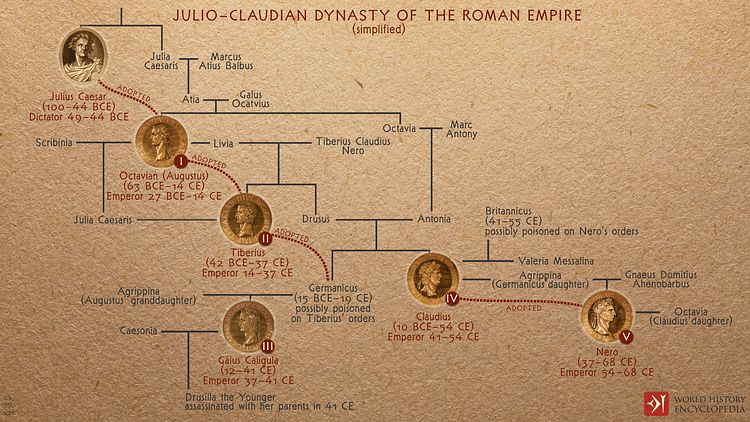
He also waged a constant war with the Jewish population in Judah who were at odds with the Greeks. When the Jews failed to give him the homage he believed he deserved as a living deity, Caligula threatened to have a statue of himself erected in the Temple of Jerusalem but luckily was convinced otherwise in order to prevent further rioting. Historian Philo, a contemporary of Caligula (sometimes called Philo the Jew or Philo of Alexandria) said that Caligula
regarded the Jews with most especial suspicion as if they were the only persons who cherished wishes opposed to him...(and) believe(d) there was but one God, their Father and the creator of the world.
Death & Legacy
Finally, after only four years as emperor, in January 41 CE, Caligula was murdered by members of the Praetorian Guard led by Cassius Chaerea, who had been a constant target for Caligula's insults. His wife, Caesonia, and daughter were murdered as well, and to add insult to Caligula's memory, the man he had ridiculed for years was named his successor. Found cowering behind a curtain, fearing for his own life, and the only surviving adult male, Claudius (r. 41-54 CE), was named the new emperor of the Roman Empire.
It should be noted that some present-day historians are looking at Emperor Caligula with a new set of eyes. As we have seen, many of the ancient sources - Suetonius is the most famous - viewed him as a depraved, self-absorbed ruler. Unfortunately, this bias has trickled down to present day authors, and, therefore, this older view of him remains. The reason for this bias is simple. Many of those early authors who wrote on Caligula were commissioned by later emperors who viewed the fallen emperor in a more negative light. While much of what was written about him is, in part, true, a newer depiction of Caligula might inquire about the causes of his dramatic change in personality and concentrate on many of the more positive aspects - the accomplishments - of his brief reign.
